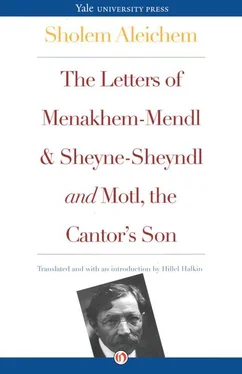We got the hang of it pretty quick. Pinye was the quickest. He was talking perfect German in no time. He says that’s because he studied it back home. But Elye says he never studied a word and picked it up just as well. I’m learning it too. The only one who doesn’t cotton to it is Brokheh. She goes on speaking Jewish. She’s on the slow side, Brokheh is.
My mother doesn’t want to speak German either. She says she wants to talk the way she’s used to. Why twist her tongue for no good reason? She has it in for German. Back in Kasrilevke, she says, she thought all Jews who spoke it were honest. Now she sees that the German Jews are no saints. One even shortchanged her in the market. It seems you can be a thief in German too.
Brokheh joins the conversation. “I’ll say you can! Why, each is a worse thief than the next! At least back home we knew the thieves were Christians.”
“Back home, my dear, the Christians knew it too.”
My mother has a story about that. We had a Christian neighbor named Khimke, a fine woman and a thief like all her kind. If she came to visit and my mother left the room, Khimke made sure to leave it too. That’s how afraid she was of stealing if left alone.
Everything is different with the Germans. Even their money is different. They’ve never heard of kopecks and rubles. They have groschen and schillings. One ruble is worth a bunch of groschen. My mother calls them “buttons” and says they aren’t real money. Elye says they melt like snow between your fingers. He goes off each day to a corner, unstitches his secret pocket, takes out a ruble, and sews the pocket back up. The next day he opens it again and takes out another ruble.
The days go by and our baggage hasn’t arrived. It looks like the woman who ran us across the border has pulled a fast one. First her pals stick us up in the forest and now we’re stuck without our things. My mother wrings her hands and cries: “Our pillows! Our quilts! How will we go to America without them?”
Pinye has an idea. He’s going to file, he says, a zayavlenye, which is a protest, with a proshenye, which is a petition, to the natshalnik, who is the commander of the border post. Or else he’ll cross the border himself and find the woman with the wig. He’ll make her rue the day she was born. He’ll give her what for, Pinye will.
It’s all a lot of hot air. All the zayavlenyes and proshenyes in the world won’t do any good. And Pinye won’t cross any borders because Taybl won’t let him. Not for all the Tsar’s gold, she says. Running the border once was enough for her. To tell the truth, it was enough for us all.
We tell our story to everyone: how we met the woman with the wig, and how she told us how to run the border, and how we were taken to the forest, and how we almost had our throats slit, and how Brokheh has a habit of fainting, and how my mother screamed and the soldiers shot and the men ran away and our lives were saved.
That’s my mother’s version. Elye has his own. Before he gets very far with it, Brokheh butts in with hers. But Brokheh, Taybl says, doesn’t remember because she passed out. Taybl tells it her way and is interrupted by Pinye, who says Taybl doesn’t know a thing. And so Pinye tells the whole story from the beginning. We tell it over and over each day, mouthing the words and nodding as we listen. Everyone says we were lucky and should say a special prayer of thanks.
Life on this side of the border is good. In fact, it couldn’t be better. There’s not a stitch of work to be done. Either we sit in our inn or go for walks in the city. I’ve told you what a fine place Brody is. I don’t know what Brokheh has against it. Every day she has some new complaint. This here is no good, and that there isn’t clean, and something else smells bad, and back home it was different. Once she let out a scream in the middle of the night. We all jumped out of bed.
“What is it? Thieves?”
“What thieves? Bedbugs!”
In the morning we went to complain to the innkeeper. He couldn’t make head or tail of it until Pinye explained to him in German what the matter was. Never in his life, said the innkeeper, had he heard the likes of it. Not in the whole kingdom of Austria. We must have brought the bedbugs from Russia.
Did Brokheh blow her top! A Jew like our innkeeper, she said, is worse than a Jew who’s been baptized. It beats me why she said that, because the innkeeper seems like a fine fellow. He talks with a lopsided grin and likes to give friendly advice about where to go and who to buy from and who to steer clear of. Sometimes he even comes along.
Mostly, we buy clothes. We’ve become spiffy dressers. Pinye says it isn’t nice to dress like bums. A tourist, he says, should dress respectably. And especially in a country where everything is dirt cheap. The first thing he bought was a top hat. After that he bought a new tie and a frock coat, the kind that comes down to the knees.
You’d have to be made of cast iron to keep a straight face when Pinye wears his new clothes. He’s tall, he’s thin, he’s nearsighted, and he walks with a bounce, remember? And his nose! My mother says he looks like a circus clown. Elye says it’s more like an organ grinder. Pinye says he’d rather be an organ grinder than a bum.
Elye says he could dress like a German too if he wanted. It’s no trick to throw away your money, he says. In America we’ll need every penny. Pinye says money won’t be a problem there. In America, he says, every man is worth his weight in gold. He nagged until Elye bought a top hat and a frock coat too. Now when we walk down the street talking German, we could pass for natives if not for the women. I mean my mother, Brokheh, and Taybl. They follow us everywhere. My mother is afraid of getting lost and Brokheh and Taybl tag after her like calves. Don’t ask me what they’re afraid of. The six of us are always together. Everyone stares at us. You would think no one had seen a Jew before.
“The Germans are the world’s biggest fools,” Elye says. “They’ll believe anything they’re told.”
“Provided it doesn’t involve money. They’re money-mad. Why, they’d sell their souls for a groschen. And their father for a schilling and God himself for two!”
That’s Brokheh. Taybl agrees. None of the women like the Germans. You can search me why they don’t. I like them fine. I could stay here forever if we weren’t going to America. Where else do you have such houses? And the people! They’re swell folk. There’s nothing they won’t sell you. Even the cows here are different. I’m not saying they’re smarter than our Russian cows, but they’re more human, that’s for sure.
Try telling that to the women, though. They’ll only answer that everything was better back home. Nothing is good enough for them, not even our inn. They don’t like its owners. “They skin you alive,” Brokheh says. “They make you pay for a glass of hot water, even for a pinch of salt. If we don’t leave this place soon, we’ll end up begging in the street.”
That’s what she says, Brokheh. Brokheh says a lot of things. She says Elye is an old maid. She says Pinye is the joker in the deck. Anyone else in Taybl’s place would have smacked her long ago. But Taybl is without a drop of gall. She doesn’t talk back to Brokheh. No one does, not even me. She’s a terror, Brokheh is. She calls me “Crumb-bum” and “Motl Chop-Chop.” Since we’ve been on the road, she says, I’ve grown a fine pair of chops. I wouldn’t give her the satisfaction of answering. My mother can’t stand it and cries. Elye hates that. He says her eyes are ruined. With eyes like hers we’ll never make it to America.
I have news! We’ve heard from our pillows. The woman who ran us across the border is in jail. Pinye is delighted. He says the police should be congratulated. “So congratulations,” says my mother. “Now where are my linens?” “The same place mine are,” Pinye says. We may as well face it. We’ll never see them again.
Читать дальше












